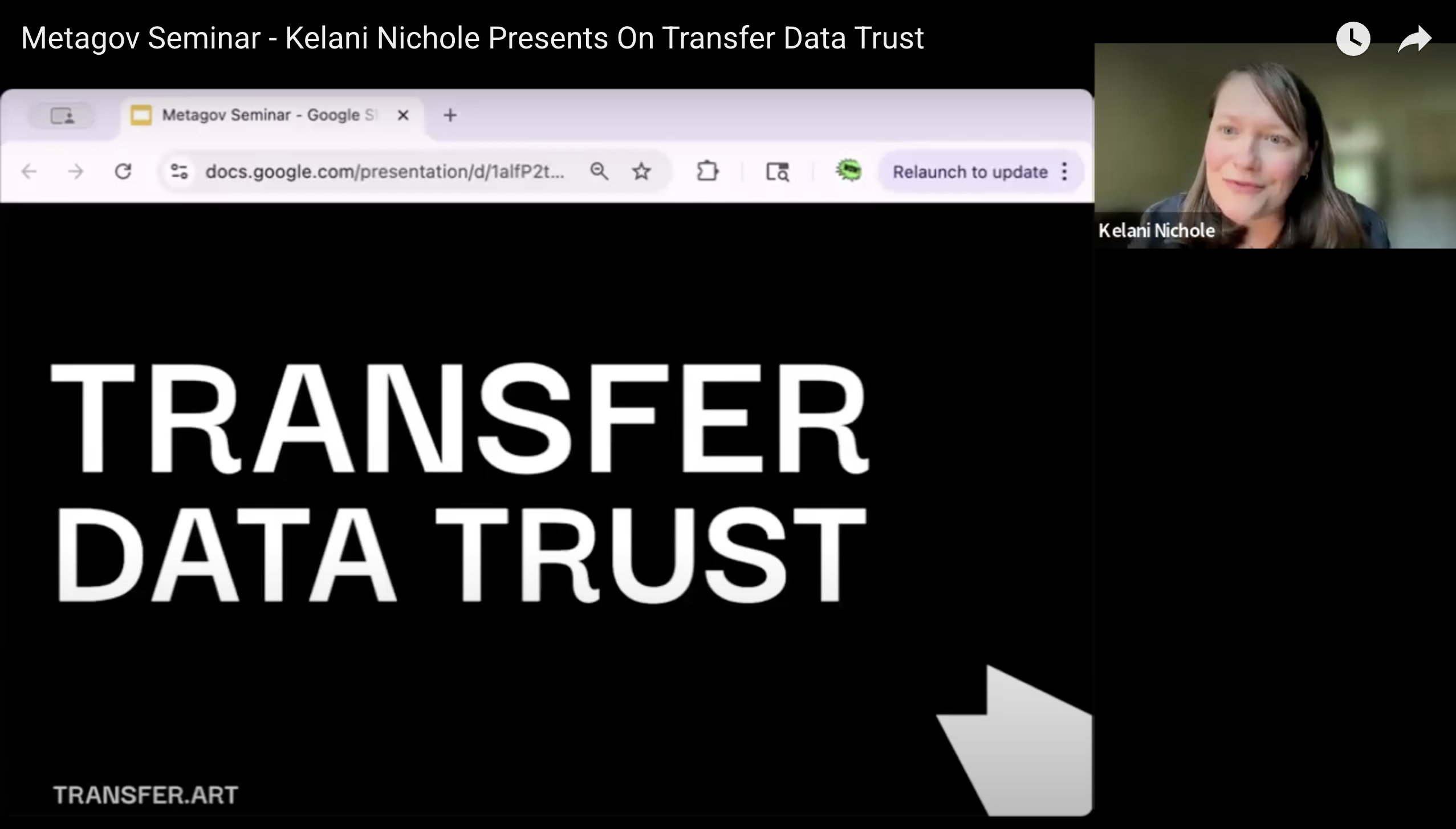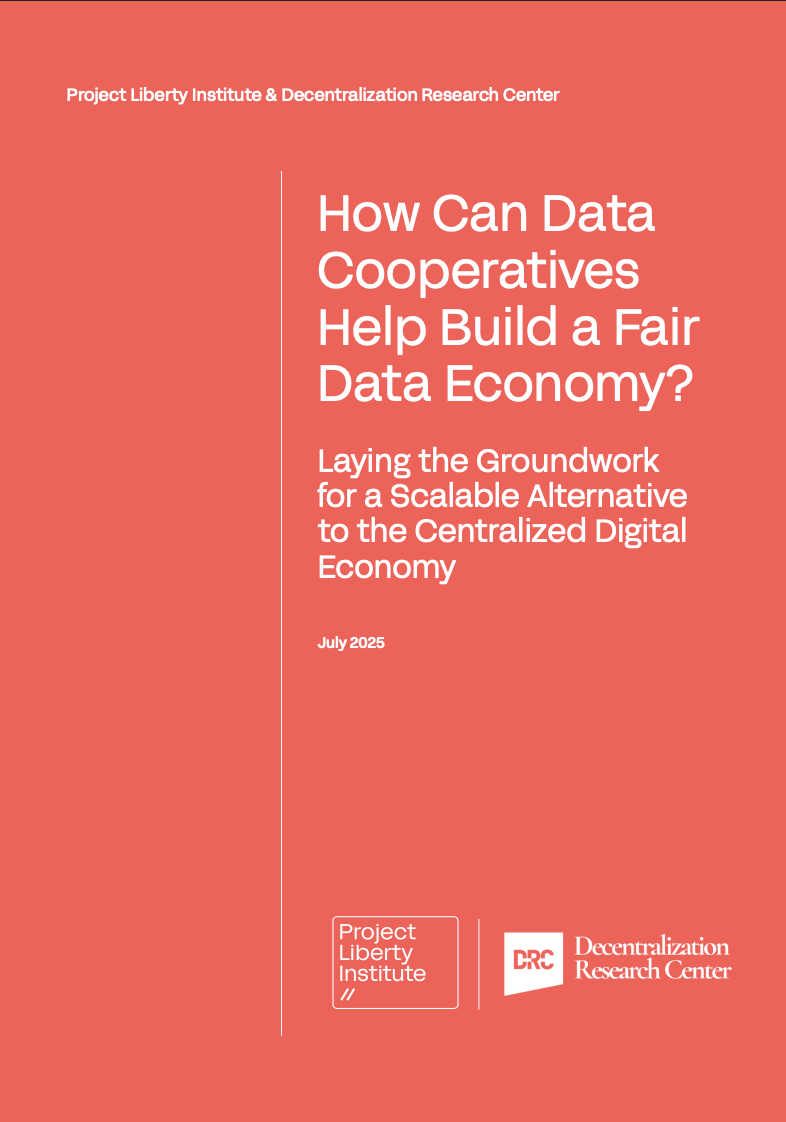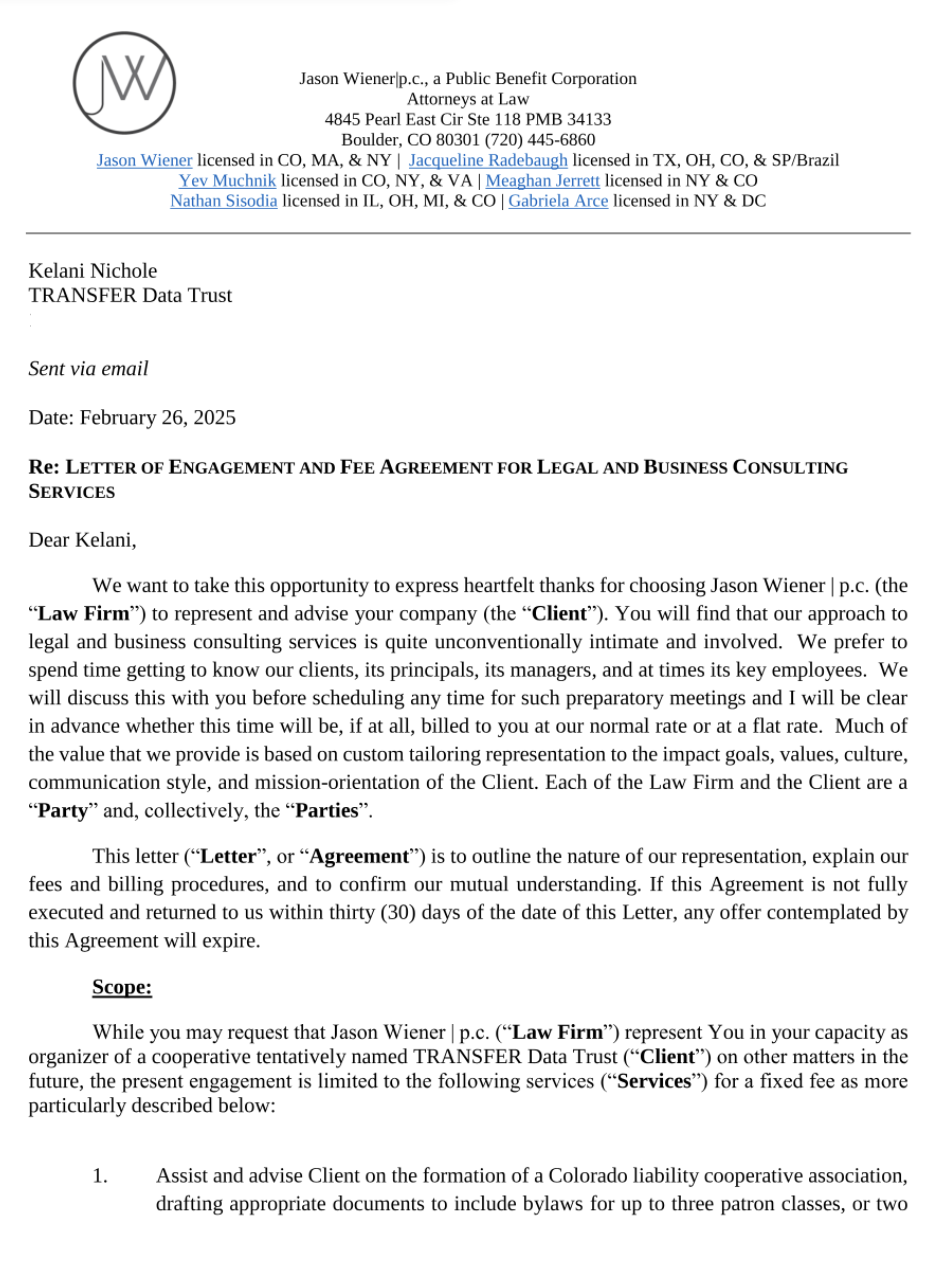Our model is based on mutual support and experimentation
TRANSFER Data Trust is a member-owned copperative. Our governance model facilitates distributive justice in contemporary art. Decisions that shape the cooperative are recorded below, along with talks and publications about our governance structure, to keep members and supporters informed of our progress.
Founding Members convene to review the final documents for cooperative formation, and vote unanimously to file the articles of incorporation to establish the co-op.
Members in attendance: Kelani Nichole, Regina Harsanyi, Wade Wallerstein, Rosa Menkman, Lorna Mills, Carla Gannis, Huntrezz Janos, Eva Papamargariti
Metagov invites TRANSFER Data Trust to share our story and discuss the details of our data governance model. Questions from the community help us test our thinking and speak to the more experimental parts of our model for artist-owned data cooperatives.
Watch the recording

TRANSFER Data Trust Cooperative obtains registered agent services with VCorp and secures a virtual address in the jurisdiction.
A detailed case study on TRANSFER Data Trust is featured in a report from Project Liberty and the Decentralization Research Center. “Data Co-ops as a Scalable Alternative to the Centralized Digital Economy” The case study details out our history and some of the principles of our approach to data governance.
Download the full report

Founding members convened to review the membership agreement and policies document to ensure they reflect the commitments and expectations we discussed in our monthly meetings. Questions emerged about international tax responsibilities, logistics of maintaining nodes, and specifics on ‘Artist Proof’ commitments and the related withdrawal terms. A fruitful discussion ensued, and small changes were incorporated to the final set of documents.
The final consultation included a thorough review of the Membership Agreement and Policies documents, as well as aligning on finer points about contributions, capital flow, and membership responsibilities. Our final set of documentation includes:
- Articles of incorporation
- Bylaws
- Artist Member Agreement
- Caretaker Member Agreement
- Artist Member Policies
- Caretaker Member Policies
In the second round of consultation, the cooperative's commitments and equity shares were discussed in more detail. Considerable discussion was focused on the 'points' based annual disbursement model and the following formula was developed:

This formula was tested in different scenarios with our members and consensus was reached on our vision and reasoning behind pursuing this redistributive solidarity model.
In the course of the consultation it became clear that the cooperative's aim of starting small and growing slowly meant that changes to the structure of our governance were core to the idea. After testing this model for a period of 2 years, we intend to revise and grow, opening up new challenges around consensus, equal contribution and distribution of points. Because of this anticipated realignment, we structured a membership agreement and member policies separate from the bylaws to make it easier to modify those documents to accommodate changes down the line.
Kelani Nichole and Jacqueline Radebaugh convened for a discussion of the cooperative's principles and goals, along with a deep dive into the desired governance model. The conversation laid the foundation for the cooperative bylaws, which includes:
- ARTICLE I: MEMBERSHIP; AUTHORIZED CAPITAL
- ARTICLE II: MEETINGS OF MEMBERS
- ARTICLE III: DIRECTORS; OFFICERS
- ARTICLE IV: DUTIES OF DIRECTORS AND MANAGEMENT
- ARTICLE V:CAPITAL
- ARTICLE VI: DISSOLUTION; LIQUIDATION; COOPERATIVE SALE; WINDING UP
- ARTICLE VII: UNCLAIMED MONEY
- ARTICLE IX: MERGER, SALE, CONSOLIDATION, OR
- EQUITY CAPITAL EXCHANGE
- ARTICLE X: DISTRIBUTION OF BYLAWS
- SCHEDULE 1: TRANSFER Data Trust Cooperative Bylaws Membership Fee + Dues

Founding members convene monthly, commencing in June 2024, to discuss the governance and structure of the trust. Kelani Nichole brought expert advice and extensive research on entity types, legal jurisdictions, tax implications, governance models, and the history of cooperative organizations to the group for consideration. Our governance model took shape after 9 months of learnings and deep discussions, weighing the pros and cons of different approaches, and looking back at what had worked for us in the 10 year history of mutual support at TRANSFER.
On February 10th, 2025 we gathered to review the first structured draft of our governance model, and played out the resources, decisions, and activities we hoped to pursue together.
The core of the model is focused on:
- Data Stewardship: regular contribution and maintenance of the archives, and shared responsibility to maintain the infrastructure which holds that data.
- Distributive Justice: commitment over compensation is key to our ethos. Recognizing that artistic works have different financial value, we sought a points-based system that recognized everyone’s contribution regardless of their pricepoint.
- Transparency and Equal Ownership: operating at a very small scale allows us to give every member equal ownership and decision making responsibilities. Recognizing that this works for now at the scale of trust, we designed flexibility in our cooperative structure to evolve the model for ownership, distribution and decision making as the membership grows.
Founding members voted unanimously to retain legal counsel and begin the process of articulating bylaws.